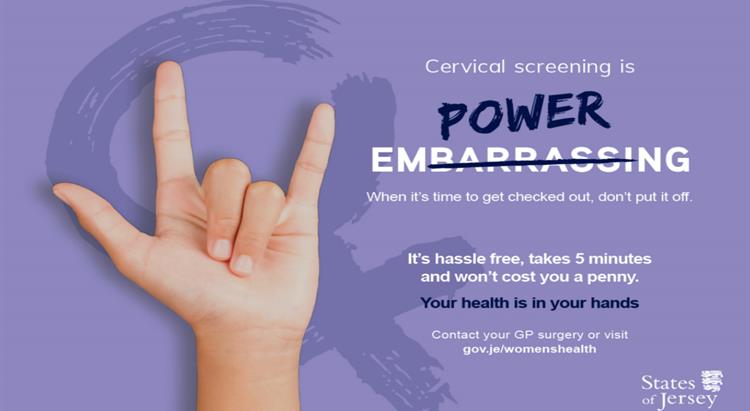26 November 2018

Young women aged 25 or over who have never had a cervical screening (smear) test are being targeted in a new campaign to book an appointment and not put off having the potentially lifesaving examination.
Health and Community Services have launched the new campaign this week through States of Jersey social media channels to encourage women to get their first cervical screening test.
The campaign encourages women to feel empowered and take charge of their health by having screening, rather worry about it. Once they have attended for their first screening, they will automatically receive a reminder every three years.
Head of Preventive Programmes at Health and Community Services, Dr Linda Diggle, said: “While having a smear test might be embarrassing, it’s a potentially life-saving test. Cervical cancer is the most common cancer in women aged 35 and under, often striking a woman in the prime of her life. In most cases, having a smear test helps prevent cervical cancer, as the test is designed to detect cervical abnormalities before cancer has developed and when abnormalities can be treated in an out-patient clinic.
In 2018, Health and Community Services worked with Social Security and GP colleagues to make the test free at all GP surgeries, in an effort to remove obstacles that might put women off attending.
Dr Diggle added “We listened when women told us the cost of screening was stopping them attending so now having a smear test won’t cost you a penny. Many women ask for a female doctor or nurse when they book a smear appointment and surgeries are well used to this. The test takes 5 minutes.
"As long as the results of your smear are normal, you only need to attend once every three years. If you had the HPV vaccine when you were younger, your chances of getting cervical cancer are much reduced but you should still attend for screening."
Latest data shows that in the three months since the test became free in Jersey (1st Aug–end Oct 2018), 1,010 eligible women attended their surgery for screening. This compares to 817 for the same period in 2017.
“We know that once women have had their first cervical screening test, they are more likely to attend when recalled in subsequent years, but we need to get them ‘on the system’,” said Dr Diggle. “Not all young women know about the programme or come forward at 25 to have a smear. We hope our new social media campaign, aimed at younger women, will encourage them to book in and get this important test."
Regular screening can stop around 75% of cervical cancers developing. As in the NHS, Jersey’s cervical screening programme starts at age 25. Dr Diggle said “It’s important not to screen earlier because changes in the cervix are very common in younger women and normally clear up on their own. If we were to screen and treat cervical changes before age 25, evidence tells us we could do more harm than good. Once a woman reaches 25, however, she must take the risk of cervical cancer seriously and get her first test.
“Don’t think this is a cancer of older women, it isn’t. We want every young woman who attends to spread the word to her friends. It’s alright to be embarrassed, we all are – just be empowered to take charge of your own health and get your first test."
Cervical screening is offered every 3 years for women aged 25 to 49. From 50 to 64, woman require a smear test every 5 years. By age 64, for most women their risk becomes so low and, providing recent tests were normal, screening can safely stop altogether.